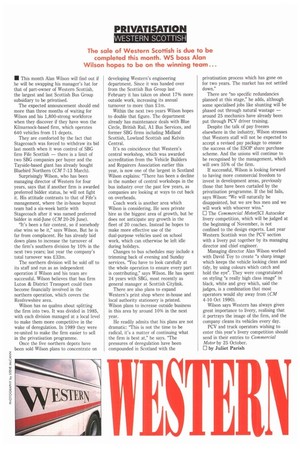PRIVATISATION
Page 28

If you've noticed an error in this article please click here to report it so we can fix it.
WESTERN SCOTTISH
The sale of Western Scottish is due to be completed this month. WS boss Alan Wilson hopes to be on the winning team..
• This month Alan Wilson will find out if he will be swapping his manager's hat for that of part-owner of Western Scottish, the largest and last Scottish Bus Group subsidiary to be privatised.
The expected announcement should end more than three months of waiting for Wilson and his 1,800-strong workforce when they discover if they have won the Kilmarnock-based firm, which operates 640 vehicles from 11 depots.
They are comforted by the fact that Stagecoach was forced to withdraw its bid last month when it won control of SBG firm Fife Scottish — there is a limit of two SBG companies per buyer and the Tayside-based giant has already bought Bluebird Northern (CM 7-13 March).
Surprisingly Wilson, who has been managing director of Western for four years, says that if another firm is awarded preferred bidder status, he will not fight it. His attitude contrasts to that of Fife's management, where the in-house buyout team had a six-week battle with Stagecoach after it was named preferred bidder in mid-June (CM 20-26 June).
"It's been a fair contest, so if somebody else wins so be it," says Wilson. But he is far from complacent. He has already laid down plans to increase the turnover of the firm's southern division by 10% in the next two years; last year the company's total turnover was £33m.
The northern division will be sold off to its staff and run as an independent operation if Wilson and his team are successful. Wilson believes that bus firm Luton & District Transport could then become financially involved in the northern operation, which covers the Renfrewshire area.
Wilson has no qualms about splitting the firm into two. It was divided in 1985, with each division managed at a local level to make them more competitive in the wake of deregulation. In 1989 they were re-united to make the firm easier to sell in the privatisation programme.
Once the five northern depots have been sold Wilson plans to concentrate on developing Western's engineering department. Since it was handed over from the Scottish Bus Group last February it has taken on about 17% more outside work, increasing its annual turnover to more than Y.1m.
Within the next two years Wilson hopes to double that figure. The department already has maintenance deals with Blue Circle, British Rail, Al Bus Services, and former SBG firms including Midland Scottish, Lowland Scottish and Kelvin Central.
It's no coincidence that Western's central workshop, which was awarded accreditation from the Vehicle Builders and Repairers Association earlier this year, is now one of the largest in Scotland Wilson explains: "There has been a decline in the number of central workshops in the bus industry over the past few years, as companies are looking at ways to cut back on overheads.
Coach work is another area which Wilson is considering. He sees private hire as the biggest area of growth, but he does not anticipate any growth in the fleet of 20 coaches. Instead he hopes to make more effective use of the dual-purpose vehicles used on school work, which can otherwise be left idle during holidays.
Changes to bus schedules may include a trimming back of evening and Sunday services. "You have to look carefully at the whole operation to ensure every part is contributing," says Wilson. He has spent 24 years with SBG, most recently as general manager at Scottish Citylink.
There are also plans to expand Western's print shop where in-house and local authority stationery is printed. Wilson plans to increase outside business in this area by around 10% in the next year.
He readily admits that his plans are not dramatic: "This is not the time to be radical, it's a matter of continuing what the firm is best at," he says. "The pressures of deregulation have been compounded in Scotland with the privatisation process which has gone on for two years. The market has not settled down."
There are "no specific redundancies planned at this stage," he adds, although some specialised jobs like shunting will be phased out through natural wastage — around 25 mechanics have already been put through PCV driver training.
Despite the talk of pay freezes elsewhere in the industry, Wilson stresses that Western staff will not be expected to accept a revised pay package to ensure the success of the ESOP share purchase scheme. And the unions will continue to be recognised by the management, which will own 55% of the firm.
If successful, Wilson is looking forward to having more commercial freedom to invest in development areas, previously those that have been curtailed by the privatisation programme. If the bid fails, says Wilson: 'We will naturally be disappointed, but we are bus men and we will work with whoever wins."
[]The Commercial Motor/IC! Autocolor livery competition, which will be judged at the beginning of November, is not confined to the design experts. Last year Western Scottish won the PCV section with a livery put together by its managing director and chief engineer.
Managing director Alan Wilson worked with David Toy to create "a sharp image which keeps the vehicle looking clean and tidy, by using colours which catch and hold the eye". They were congratulated on styling "a really high class image" in black, white and grey which, said the judges, is a combination that most operators would shy away from (CM 4-10 Oct 1990).
Wilson says Western has always given great importance to livery, realising that it portrays the image of the firm, and the company cleans its vehicles every day.
PCV and truck operators wishing to enter this year's livery competition should send in their entries to Commercial Motor by 25 October.
by Juliet Parish












































































